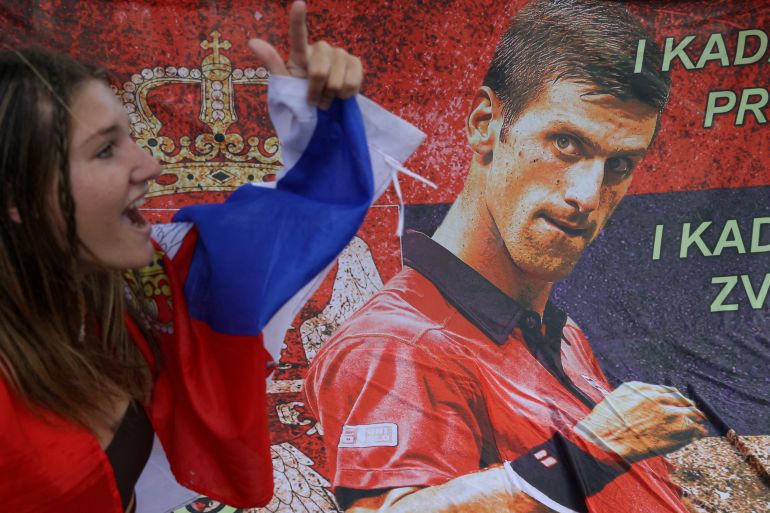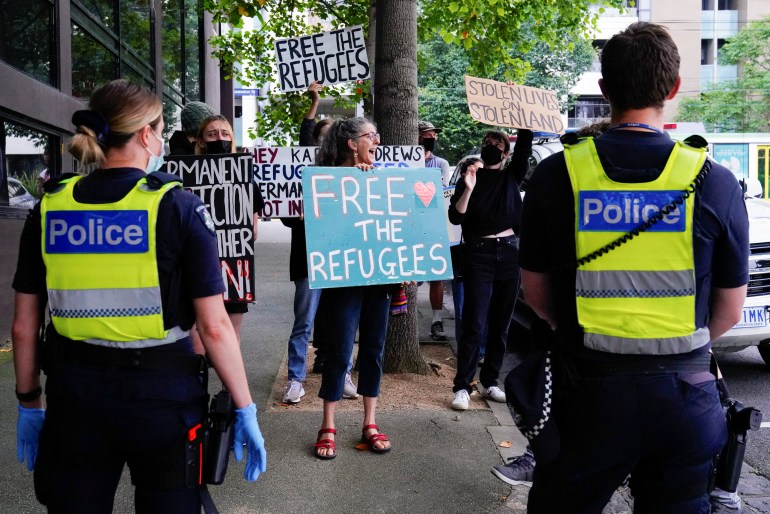Australia court begins hearing Djokovic bid to avoid deportation
World’s top male tennis player fighting deportation amid questions over COVID-19 status.

An Australian court has begun hearing an appeal by tennis star Novak Djokovic, the world’s top male player, over whether he met COVID-19 exemption rules to allow him entry to the country, less than two weeks before the start of the Australian Open tennis tournament.
Djokovic was detained at the airport when he arrived on Wednesday night after his visa was cancelled.
Keep reading
list of 4 itemsDjokovic lawyers say COVID infection gave him Australia exemption
‘Speak up’: Australia refugees urge Djokovic to advocate for them
Djokovic hearing adjourned, to remain in immigration detention
Authorities said the 34-year-old player did not have sufficient evidence to qualify for the medical exemption from COVID-19 vaccination he said he had been given.
Australia has not yet fully opened its borders, and any non-resident foreigners are supposed to be fully vaccinated – with limited exemptions. News of Djokovic’s claimed exemption heightened anger in domestically as it is battling a new wave of coronavirus and where many families have been separated for years because of strict limits on international arrivals.
Djokovic says that he tested positive for COVID-19 in December making him eligible for the waiver.
The virtual hearing was due to begin at 10am (23:00 GMT) after the judge refused a government request to delay the case for a couple of days.
Proceedings eventually got under way half an hour late after technical issues delayed the start, but there were repeated drop-outs and interruptions to the public live stream of the hearing as thousands tried to follow what was happening.
Djokovic, who is bidding for a record 21st Grand Slam victory at the Australian Open, which starts in Melbourne on Jan 17, has been held at the Park Hotel, a so-called “alternative place of detention” since his visa was revoked last week. The facility has become notorious for housing people recognised as refugees but still held in detention because they arrived in the country by boat.

Djokovic’s lawyers opened the hearing by saying he had the necessary permissions to enter Australia and an email on the exemption from Home Affairs.
In submissions to the judge, they noted the player had ticked the box on the official government form that has to be completed before departure saying that he could not be vaccinated for medical reasons, and had also uploaded supporting documents provided by the chief medical officer and Tennis Australia.
Earlier they said the Serbian had told immigration officers repeatedly in the hours following his arrival that if he were given his phone he would be able to get the additional information they were asking for.
Judge Anthony Kelly appeared quite sympathetic to the player’s situation: “The point I’m agitated about,” he said, “is what more this man could have done.” He later ordered that immigration authorities allow Djokovic to leave the Park Hotel in order to view the hearing.
In documents provided ahead of the proceedings, the government said an email from the Department of Home Affairs could not be seen as an assurance “that his so-called ‘medical exemption’ would be accepted”, and that the player’s responses could be questioned and verified on his arrival.
The government also challenged Djokovic’s claim for a medical exemption on the basis that he had recently had COVID-19.
“There is no suggestion that the applicant had “acute major medical illness” in December 2021. All he has said is that he tested positive for COVID-19. This is not the same,” the filing said.
Al Jazeera’s Sarah Clarke, who is in the Australian city of Brisbane, said there was no clear indication of when the judge would make his decision but there were a number of possible scenarios including Djokovic being able to play if he wins the case or given special dispensation to play if the proceedings are drawn out. If the player loses, the government has pushed for immediate deportation.
“It’s a saga with a lot of confusion with regards to the options and outcomes that could come out of this court hearing,” she said.